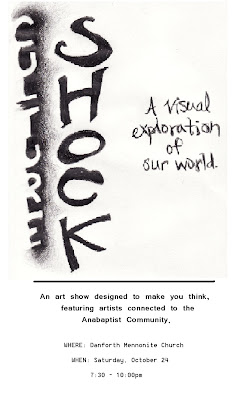- from Richard Reesor & Bruce Syvret:Background Information
In November 2007, a group of members of Community Mennonite Church met to discuss the potential of alternative home energy sources as a means to reducing our collective carbon footprint. In particular, the group was interested in considering the potential of solar power as a home energy source. Various members of the group were involved by collecting information, consulting with potential suppliers, analyzing the environmental impact and evaluating the financial feasibility. The assessment indicated that the project seemed viable and it was decided that the next step was to proceed with the installation of a PV solar system on the home of one of the members as a prototype. A 2.52 kW system was installed in September of 2008 and connected to the Ontario electrical grid in late October. The following is a summary of the results to date.
Energy Production Summary
Projected Actual
Month kWh kWh
November 140 130
December 120 120
January 151 160
February 195 200
March 256 270
April 289 170 (Apr 1-15)
Total 1151 1050
Financial Analysis
The system installed was under the Standard Offer Program (SOP) which pays $0.42 /kWh. Annual energy production is estimated to be 2957 kWh, resulting in annual revenues of $1,242. The electricity generated is roughly 2/3 of the annual electricity used by the home. The cost of the system installed, net of rebates, is approximately $20,000. The payback period is estimated to be 16 years, representing a 6-7% return on investment.
A recent change to the SOP has raised the price of the generated energy to $0.80 /kWh. This change has dramatically changed the financial viability of the project. As a result, a PV roof mounted solar system installed under the new price structure will generate annual revenues equal to approximately 9% of the cost of the system indicating a payback period of roughly 11 years. As an example, a $20,000 system would generate roughly $1,800 per year in electricity. Annual maintenance costs for the life of the contract are expected be insignificant.
Environmental Analysis
Calculating the environmental impact of generating solar electricity is not an exact science. However, estimates can be made. The following website, www.carbonify.com/carbon-calculator estimates that the CO2 emissions created from the generation of 3000 kWh of coal equals 2.25 metric tonnes. A careful reader of this analysis will question the logic of basing the calculation of the CO2 emissions based on coal noting that in Ontario less than half of the energy generated is sourced from fossil fuels. While this is correct, it should be noted that the peak solar generation production period coincides with peak power usage in the province. The province relies on fossil fuels to cover this peak demand period. In effect, solar generated power more or less replaces fossil fuel generated power; hence the defence for basing the estimate on CO2 emissions on replacing coal generated electricity.
It should also be noted that while this savings in CO2 emissions is considerable, compared to other typical household activity, it is less significant. For example, the above mentioned carbon calculator estimates that a medium sized vehicle driving 1500 km`s per month emits 6.6 tonnes CO2 annually. Therefore, a 33% reduction in personal car travel would have a similar impact on CO2 emissions. Another example is the household clothes dryer. The following website, http://hubpages.com/hub/The-Return-of-the-Clothesline-Debate claims that a typical dryer is responsible for 1 tonne of emissions per year. The implication is that a $50 investment in a clothes line has the potential to save almost as many emissions as a $10,000 investment in a solar generator. These examples are not mentioned to diminish the potential benefits of solar power; rather they are mentioned to highlight the importance of energy conservation as the first step in reducing CO2 emissions.
Summary Information
The experience to date has been very positive. It would appear that the initial projections for energy generation provided by the system provider are accurate. As the table above indicates, actual energy produced to date has been very close to projections. The installation was handled very professionally, with minimal effort required on my part. Based on experience to date, and the added incentive of the updated SOP, it would seem that the technology is financially viable and could be considered by other interested members of the community. However, it should also be noted that as the discussion above mentions, a solar generation installation should only be considered in conjunction with other conservation measures. As good as the financial return may be for a PV system under the SOP, other ``low tech`` solar technologies such as clothes lines and energy conservation measures should be considered as a first step in reducing ones carbon footprint.
Submitted by Richard Reesor & Bruce Syvret
